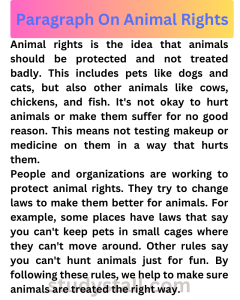Animal rights is an important and widely debated topic in society today. This issue revolves around the ethical treatment of animals and their rights to live a life without suffering or exploitation. As humans, it is our responsibility to protect and advocate for the rights of animals, recognizing their intrinsic value and the need for their well-being.
Paragraph On Animal Rights 100 words
Animal rights means that animals should be treated well and not hurt for no reason. Just like people have rights to be safe and happy, animals should have some rights too. This is why there are rules against hurting pets or hunting animals for fun. Many people work to protect animals and make sure they are treated in a kind way.
Paragraph On Animal Rights 200 words
Animal rights is the idea that animals should be protected and not treated badly. This includes pets like dogs and cats, but also other animals like cows, chickens, and fish. It’s not okay to hurt animals or make them suffer for no good reason. This means not testing makeup or medicine on them in a way that hurts them.
People and organizations are working to protect animal rights. They try to change laws to make them better for animals. For example, some places have laws that say you can’t keep pets in small cages where they can’t move around. Other rules say you can’t hunt animals just for fun. By following these rules, we help to make sure animals are treated the right way.
Paragraph On Animal Rights 300 words
Animal rights is all about making sure animals are treated kindly and fairly. It’s not just about pets like dogs and cats, but also farm animals and even wild animals. The basic idea is that animals should not suffer needlessly. This means they should have enough food, space to move around, and proper care when they are sick.
Sadly, not all animals are treated this way. Sometimes they are used in experiments, or kept in bad conditions on farms. Some are hunted or captured for no good reason. That’s why many people and groups work to protect animal rights. They try to make new rules and laws that protect animals from suffering.
One way to help is by adopting pets from shelters instead of buying them from stores that might not treat them well. Another way is to choose products that were made without hurting animals, like makeup that wasn’t tested on them. By making good choices and supporting rules that protect animals, we can help to make their lives better.
Animal rights is important for the animals, but it’s also good for people. When we treat animals well, it shows that we are kind and thoughtful. It helps us to be better people. So, protecting animal rights is good for everyone.
Paragraph On Animal Rights 500 woreds
The Concept of Animal Rights
Animal rights advocates argue that animals should be granted certain fundamental rights, similar to those granted to humans. These rights include the right to life, liberty, and freedom from cruelty and unnecessary suffering. This perspective challenges the traditional view that animals are mere objects for human use and emphasizes their inherent worth and ability to experience pain and pleasure.
Animal Welfare vs. Animal Rights
It is essential to differentiate between animal welfare and animal rights. Animal welfare focuses on ensuring that animals are treated humanely and provided with proper care and conditions. While animal welfare advocates seek to improve animal welfare and minimize suffering, they do not necessarily challenge the idea of animals being used for human purposes.
On the other hand, animal rights proponents argue that animals should not be subjected to any form of exploitation or mistreatment, regardless of the potential benefits to humans. They believe that animals have the right to live their lives free from interference and harm, irrespective of their usefulness to humans.
Historical Perspective
The concept of animal rights dates back to ancient civilizations, such as Ancient Greece and India, where philosophers and religious leaders expressed their concerns about animal welfare. In recent history, the animal rights movement gained momentum in the 1970s, with the establishment of organizations like People for the Ethical Treatment of Animals (PETA) and the Animal Liberation Front.
Arguments in Favor of Animal Rights
There are several compelling arguments in favor of animal rights:
- Ethical Considerations: Animals possess the capacity to suffer and experience pain, just like humans. It is morally wrong to inflict unnecessary suffering on them for our pleasure or convenience.
- Intrinsic Value: Animals have inherent worth and deserve to be treated with respect and dignity, regardless of their usefulness to humans. Their lives should not be viewed as expendable commodities.
- Environmental Impact: Animal agriculture, hunting, and other forms of animal exploitation have significant environmental consequences, including deforestation, greenhouse gas emissions, and biodiversity loss. Advocating for animal rights is crucial for a sustainable future.
- Scientific Advancements: Animal testing, despite its historical role in advancing medical research, has ethical implications. Supporting animal rights encourages the development and implementation of alternative methods that do not involve animal experimentation.
- Compassion and Empathy: Recognizing and respecting animal rights fosters empathy and compassion, qualities that are vital for building a more compassionate society.
Challenges and Criticisms
While the animal rights movement has gained significant support, it is not without its critics and challenges. Some common criticisms include:
- Practicality: Critics argue that granting animals the same rights as humans would lead to impractical and unworkable scenarios. They believe it is essential to find a balance between animal rights and human interests.
- Hierarchy of Rights: Opponents question whether animals should be granted the same rights as humans, as they argue that humans possess unique cognitive abilities and moral responsibilities.
- Cultural Variations: Different cultures have varying perspectives on animal rights, making it challenging to establish a universal framework that accommodates diverse viewpoints.
- Economic Implications: Certain industries, such as factory farming and animal testing, heavily rely on the use of animals. Implementing animal rights regulations could have economic repercussions for these industries.
- Prioritization of Human Issues: Critics argue that human rights and social justice issues should take precedence over animal rights, as there are pressing human concerns that require immediate attention.
Conclusion
In conclusion, the concept of animal rights is a crucial topic that demands our attention and consideration. It is essential to recognize the inherent value and welfare of animals, promoting a society that respects and protects their rights. While there are challenges and criticisms surrounding the animal rights movement, it is through open dialogue and ethical considerations that progress can be made towards a more compassionate world for all beings.
FAQ
Q: What is the difference between animal welfare and animal rights?
A: Animal welfare focuses on ensuring that animals are treated humanely and provided with proper care and conditions, while animal rights advocates argue that animals should not be subjected to any form of exploitation or mistreatment, regardless of the potential benefits to humans.
Q: What is the historical perspective of animal rights?
A: The concept of animal rights dates back to ancient civilizations like Ancient Greece and India. In recent history, the animal rights movement gained momentum in the 1970s with the establishment of organizations like PETA and the Animal Liberation Front.
Q: What are some arguments in favor of animal rights?
A: Some arguments in favor of animal rights include ethical considerations, recognizing animals’ capacity to suffer and experience pain, the belief in their intrinsic value and deserving respect and dignity, and the view that their lives should not be seen as expendable commodities.
Q: Why is it important to advocate for animal rights?
A: Advocating for animal rights is important because it is our responsibility to protect and ensure the well-being of animals. Recognizing their intrinsic value and the need for their well-being, we should strive to prevent unnecessary suffering and exploitation of animals.
